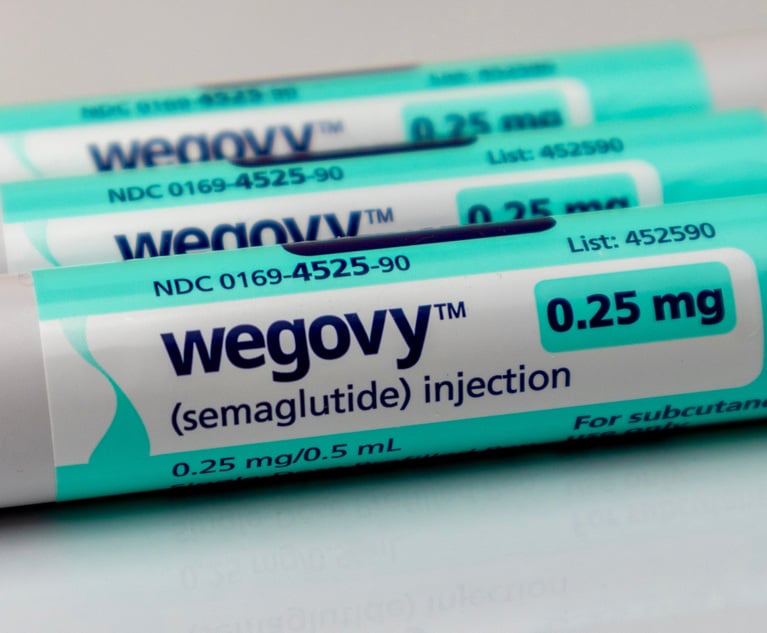St. Jude to Face Products Claim Over Allegedly Faulty Medical Device
The ruling, from U.S. Magistrate Judge Christopher J. Burke, jettisoned claims by Kathleen M. Freed that St. Jude had failed to live up public guarantees regarding the safety of its spinal cord simulator.
February 04, 2019 at 04:36 PM
4 minute read
The original version of this story was published on Delaware Law Weekly

A Delaware federal magistrate judge ruled last week that St. Jude Medical Inc. must defend part of a products liability suit claiming the Minnesota-based medical device maker had negligently manufactured a spinal cord stimulator that was implanted in a Maryland woman.
The ruling, from U.S. Magistrate Judge Christopher J. Burke, jettisoned claims by Kathleen M. Freed that St. Jude had failed to live up public guarantees regarding the safety of its spinal cord simulator, which was surgically implanted in her during a procedure at Newark's Christiana Hospital in 2014. Though the procedure was intended to be permanent, Freed said she had the device removed less than one year later, after complaining that it had caused painful electric shocks and burning.
However, Burke said that Freed's revised complaint had laid out an initial case that the device was dangerous, and granted the Freed one more chance to show that St. Jude failed to warn her and her doctors of the risks associated with its product.
The 33-page memorandum opinion, issued Feb. 1, followed another judge's decision in 2017 to dismiss the suit without prejudice, finding that their state-law claims had been pre-empted by federal law.
According to court documents, medical products like St. Jude's spinal cord simulator undergo a rigorous federal oversight and pre-market approval process, which typically protect device-makers from having to face state claims in addition to those arising under federal law.
David G. Culley, an attorney for Freed and her husband, argued that their claims ran parallel to the federal statutes because Delaware law imposed additional requirements on the company regarding the “safety and effectiveness” of the device.
In the amended complaint, he said the defect was linked specifically to the neurostimulator and battery components, which had been implanted in his client's left buttocks, alleging that St. Jude had been forced to recall similar products in the past.
Burke said the changes were enough to support Freed's claim that the spinal cord stimulator was manufactured in violation of industry and regulatory standards, addressing a key concern raised earlier in the case.
“They now include allegations that can be fairly read to assert that the battery component of the [spinal cord stimulator] device (by itself, or in conjunction with the neurostimulator) was adulterated or defective,” Burke said, adding that the revised complaint had helped “the reader draw reasonable inferences that these particular components of the device were adulterated due to federal violations.”
While Burke dismissed three counts for various alleged breaches of warranty for pre-emption, he did provide Culley one more chance to plead a claim on behalf of his client for failure to warn.
The key issue there, he said, was “why it is plausible” that St. Jude's alleged failure to report problems with its product would have reached Freed and her doctors, thus impacting their decision to go forward with the surgery. St. Jude had argued for the claim to be dismissed without prejudice; however, Burke said the issue had not been previously addressed in the case and gave Freed and her husband “one final opportunity to amend their failure to warn claim in this regard.”
Culley, a director with Tybout, Redfearn & Pell in Wilmington, was not immediately available to comment, and an attorney for St. Jude did not return a call Monday afternoon seeking comment on the ruling.
St. Jude is represented by Brian M. Rostocki and Benjamin P. Chapple of Reed Smith's Wilmington office and partners J. David Bickham and Lisa M. Baird in the firm's San Francisco and Miami offices.
The case is captioned Freed v. St. Jude Medical.
|This content has been archived. It is available through our partners, LexisNexis® and Bloomberg Law.
To view this content, please continue to their sites.
Not a Lexis Subscriber?
Subscribe Now
Not a Bloomberg Law Subscriber?
Subscribe Now
NOT FOR REPRINT
© 2024 ALM Global, LLC, All Rights Reserved. Request academic re-use from www.copyright.com. All other uses, submit a request to [email protected]. For more information visit Asset & Logo Licensing.
You Might Like
View All
Wilson Sonsini Knocks Out Claims Against Inhibrx Biosciences in Trade Secrets Verdict

'I Don't Want to Die Fearfully': Outsiders Can't Get Help to Die in NJ
4 minute read
Novo Nordisk Files Patent Claims to Fend off Generic Rivals of Wegovy
3 minute read
Trending Stories
- 13rd Circuit Strikes Down NLRB’s Monetary Remedies for Fired Starbucks Workers
- 2Latest Class of Court Officers Sworn into Service in New York
- 3Kirkland's Daniel Lavon-Krein: Staying Ahead of Private Equity Consolidation
- 4Many Southeast Law Firms Planned New, Smaller Offices in 2024
- 5On the Move and After Hours: Goldberg Segalla, Faegre Drinker, Pashman Stein
Who Got The Work
Michael G. Bongiorno, Andrew Scott Dulberg and Elizabeth E. Driscoll from Wilmer Cutler Pickering Hale and Dorr have stepped in to represent Symbotic Inc., an A.I.-enabled technology platform that focuses on increasing supply chain efficiency, and other defendants in a pending shareholder derivative lawsuit. The case, filed Oct. 2 in Massachusetts District Court by the Brown Law Firm on behalf of Stephen Austen, accuses certain officers and directors of misleading investors in regard to Symbotic's potential for margin growth by failing to disclose that the company was not equipped to timely deploy its systems or manage expenses through project delays. The case, assigned to U.S. District Judge Nathaniel M. Gorton, is 1:24-cv-12522, Austen v. Cohen et al.
Who Got The Work
Edmund Polubinski and Marie Killmond of Davis Polk & Wardwell have entered appearances for data platform software development company MongoDB and other defendants in a pending shareholder derivative lawsuit. The action, filed Oct. 7 in New York Southern District Court by the Brown Law Firm, accuses the company's directors and/or officers of falsely expressing confidence in the company’s restructuring of its sales incentive plan and downplaying the severity of decreases in its upfront commitments. The case is 1:24-cv-07594, Roy v. Ittycheria et al.
Who Got The Work
Amy O. Bruchs and Kurt F. Ellison of Michael Best & Friedrich have entered appearances for Epic Systems Corp. in a pending employment discrimination lawsuit. The suit was filed Sept. 7 in Wisconsin Western District Court by Levine Eisberner LLC and Siri & Glimstad on behalf of a project manager who claims that he was wrongfully terminated after applying for a religious exemption to the defendant's COVID-19 vaccine mandate. The case, assigned to U.S. Magistrate Judge Anita Marie Boor, is 3:24-cv-00630, Secker, Nathan v. Epic Systems Corporation.
Who Got The Work
David X. Sullivan, Thomas J. Finn and Gregory A. Hall from McCarter & English have entered appearances for Sunrun Installation Services in a pending civil rights lawsuit. The complaint was filed Sept. 4 in Connecticut District Court by attorney Robert M. Berke on behalf of former employee George Edward Steins, who was arrested and charged with employing an unregistered home improvement salesperson. The complaint alleges that had Sunrun informed the Connecticut Department of Consumer Protection that the plaintiff's employment had ended in 2017 and that he no longer held Sunrun's home improvement contractor license, he would not have been hit with charges, which were dismissed in May 2024. The case, assigned to U.S. District Judge Jeffrey A. Meyer, is 3:24-cv-01423, Steins v. Sunrun, Inc. et al.
Who Got The Work
Greenberg Traurig shareholder Joshua L. Raskin has entered an appearance for boohoo.com UK Ltd. in a pending patent infringement lawsuit. The suit, filed Sept. 3 in Texas Eastern District Court by Rozier Hardt McDonough on behalf of Alto Dynamics, asserts five patents related to an online shopping platform. The case, assigned to U.S. District Judge Rodney Gilstrap, is 2:24-cv-00719, Alto Dynamics, LLC v. boohoo.com UK Limited.
Featured Firms
Law Offices of Gary Martin Hays & Associates, P.C.
(470) 294-1674
Law Offices of Mark E. Salomone
(857) 444-6468
Smith & Hassler
(713) 739-1250






